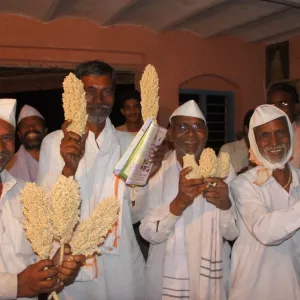Transforming agri-food systems for rural prosperity through scaling an innovative ‘Seed Consortium’ towards higher adoption and impacts
Background: Grown on 4.0 M ha, postrainy sorghum is the lifeline of dryland farmers in Maharashtra state of India. The grain is highly valued for its food use and its stover is highly preferred for animal feed. The crop is grown purely on residual soil moisture with only 50 mm rainfall received during crop growth period. While sorghum productivity during

Transforming agri-food systems for rural prosperity through scaling an innovative ‘Seed Consortium’ towards higher adoption and impacts
Background: Grown on 4.0 M ha, postrainy sorghum is the lifeline of dryland farmers in Maharashtra state of India. The grain is highly valued for its food use and its stover is highly preferred for animal feed. The crop is grown purely on residual soil moisture with only 50 mm rainfall received during crop growth period. While sorghum productivity during the rainy season in India is over 1200 kg/ha, productivity during the postrainy season is very low at 650-700 kg/ha. Lack of improved seed, poor awareness of new varieties, weak seed systems (seed replacement ratio 20%) were identified as major constraints in enhancing the adoption of new varieties.

Empowering farmers in seed production of improved varieties at Patancheru, India. Photo: ICRISAT
ICRISAT with support from the CGIAR Research Program on Grain Legumes and Dryland cereals (CRP-GLDC) focuses on transforming agri-food systems for enhancing rural prosperity. Towards this, ICRISAT and partners undertook massive transfer of improved seeds and best-bet practices empowering farmers for technology adoption that significantly increased postrainy sorghum grain yields by 35% and stover yields by 20% in over 40,000 farmers’ fields in the Maharashtra state of India. To make these inventions sustainable, an innovative ‘Seed Consortium’ was established by involving Indian National Agricultural Research and Extension System (NARES), seed agencies and farmers. The Consortium helps fix the targets to be achieved annually and work together to achieve the targeted quality seed production and supply to farmers. It involves the research institutions who supply the breeder seed, train the seed farmers and monitor the seed production plots during the crop growth season. The state seed corporation (Mahabeej) provides the buy-back guarantee to seed farmers and procure the seeds from them upon crop harvesting by paying 25% higher price than the market. Mahabeej processes the seeds and supplies to the farmers though its network of dealers across the country. With the concerted efforts by all the partners, the Seed Consortium has grown leaps and bounds producing 11,000 tons of improved seed varieties and supplying seed to 1,100,000 farmers across the postrainy sorghum growing areas in the country (Table 1.)

